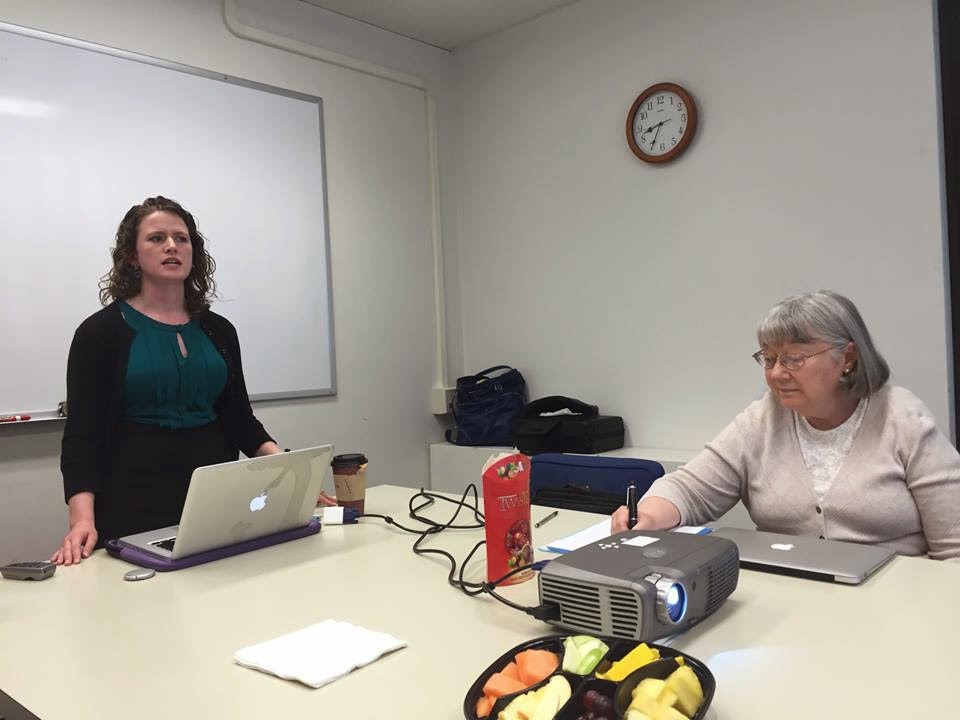Kat Kolomban's Thesis: Parent and Teacher Perspectives on Congolese Students in the American Education System
 |
| Kat Kolumban and her thesis advisor, Prof. Irene Koshik |
Every semester I have one or more students who write such elegant reflective essays that I just sit back, read and enjoy their ideas and the prose with which they express them.
This semester I had that same experience with a Master's thesis from Kathleeen Kolumban for the Master of Arts in Teaching English as a Second Language. The thesis was titled "Parent and Teacher Perspectives on Congolese Students in the American Education System. I read her 112-page thesis while I was traveling early this semester, and it was like reading a novel! I kept scrolling down the screen to see what was next, what cultural practice she would describe next, what implication for practice she suggested next, what was the next piece in the puzzle of Congolese students, their parents and their ESL teachers in Champaign-Urbana. And her writing was so clear that I was able to just focus on the ideas. Brava, Kat!
I won't describe Kat's work here except to say that she interviewed Congolese parents and ESL teachers who have Congolese students in their classes in the Champaign, Illinois school district.
I will, though, share a few of my comments.
Writing Style
Kat's clear, clean, compelling writing style is a real gift. I hope that she realizes that she is a good writer and treats that as a gift. That means that she should write, write and write!Things I will reflect upon
There was a lot of wonderful, important information throughout the thesis. However, I noted two things in particular that I want to think more about and act upon if possible:
- There appears to be "language rivalry" among the non-English speaking families. That is, Spanish-speaking families and students appear to have more resources which then gives them more chances for success. While on the one hand those Spanish-language resources were hard-fought and well-deserved, those solutions can turn out to also be problems if they set up language communities to feel resentful and create conflict. (This parallels the "Spanish problem" in language departments, where other languages feel that the size of Spanish programs hurts their enrollments and programming.)
- If this is the situation in Champaign, imagine what it is like in smaller, more rural towns in East Central Illinois new-growth communities? Worse! What happens in Rantoul? Arcola? In Effingham? In Robinson? They need this kind of information and training, even if it is not specfically about Congolese families and students.
- In describing the confusion that Congolese parents feel about "levels" and choosing classes (instead of following a pre-determined path that is the same for everyone on that same path), Kat mentioned that not knowing about these things can end up hurting students' chances to go to college. It would be good to identify a series of those "high-stakes choices" and frame them in a timeline for parents.
Orality
In describing cultural differences, Kat's thesis noted the importance of orality and oral storytelling in Congolese culture. My comment was that in the thesis, this was pointed out as "problem" to be solved by letting the Congolese parents know the expectations for written work so that they could better help their children succeed in school. I pointed out one of my mantras:
"We shouldn't just learn about other cultures; we should learn from them."In other words, what is good about orality? What benefits does it have? How could "mainstream" students benefit from increased orality?
Now what?
The typical last section in an academic research project includes implications for future research and/or implications for practice. However, in an engaged research project like Kat's, we can think more broadly about the last step in the critical reflection process (What? So what? Now what?) I'd love for Kat to think about how her wonderful insights and information can be transformed into useful information for a variety of audiences and in a variety of formats. What about some of the following?
- An infographic about the local Congolese community to present to the mayor, board, and school board, simply to raise awareness?
- A visit to our local public access television and radio show about immigration.
- A guest lecture in a U of Illinois course.
- Etc.
With so much wonderful information to share, I am excited to see what Kat will do next. Congratulations on your work!



Comments
Post a Comment